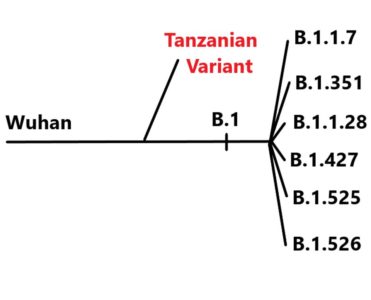A new kind of variant, feed like a teen, the monkey-man chronicles, and more
17 Apr 2021
Posted by Andrew Kantor
Three times the charm?
Not entirely surprisingly, there’s a good chance folks who got the Pfizer/BioNTech vaccine will need a booster — a third shot in a year. So says the company’s CEO.
This is actually good news. It means that Pfizer is confident that its mRNA technology can be used for boosters to protect against the variants that are emerging.
Speaking of which…
Variant updates
A new and different beastie. Unlike what we’ve seen so far in variants like B.1.1.7 (“the UK variant”) this one comes from an entirely different strain. It’s an ‘A’ variant. It’s he first of its kind.

All your variant questions answered. Finally, while we’re on the subject, you may have questions. The New York Times has most of the answers.
Don’t forget this coming Thursday…
… is GPhA’s Spring Region Meeting: April 22, from 7:00-8:00 p.m., virtually (hopefully the last time) via Zoom. Head to GPhA.org/region-meeting and sign up now!
Eat, eat, and be merry
If you’ve ever seen a teenager feed, it can be a wonder to behold. Often it’s a just faint whooshing sound … and the box of doughnuts is gone. That’s basal metabolism for ya.
But what if you could replicate that in, say, fat mice? And what if you could use an existing drug to do it?
Guess what?
Digoxin — you know, the heart-disease drug — seems to have an unexpected effect. It cuts the body’s production of interleukin 17, and by doing so reins in inflammation. That somehow increases basal metabolism and burns the weight away.
Or, put another way, it let fat mice continue to eat all they wanted, but…
These overweight mice soon obtained the same weight as healthy control mice on regular diets, with no negative side effects and the benefits observed for at least eight months.
Put another way: Take digoxin, get a teenager’s metabolism, eat all you want, lose weight.

Enjoy it while you can
U.S. dentists are enthusiastic about antibiotics
Dental care is pretty much the same across modern countries (jokes about the British aside). And yet — found a study by an international team of researchers — dentists in the U.S. prescribe antibiotics more than those in any other country. In, fact, U.S. dentists prescribe them more than twice as often as their Australian counterparts.
Why the difference? Are American infections more common than those in Australia? Not likely.
The researchers said the different rates did not seem to be explained by differences in dental health, but may be related to differences in the prophylactic use of dental antibiotics aiming to protect people at risk for distance site infections during operative dental procedures.
Perhaps, they suggest, an antibiotic stewardship program is in order.
And on the seventh day
A group of U.S. and Chinese researchers have created human-monkey chimeras: They injected six-day-old monkey embryos with human stem cells, and the result lived for about 20 days. Eventually they hope to have the monkeys-with-some-human-cells live longer, so they can “serve as helpful models for human disease, embryonic development and aging.”
The idea is that, rather than experiment on humans directly, we could experiment on monkeys with human genes, which is ethically less questionable. Right?
And yes, the Simpsons have done it.
None dare call it “precrime”
Computers, say Canadian researchers, can predict whether someone with a psychiatric disorder is likely to commit a crime — and can do it better than humans.
And there is nothing whatsoever creepy about this quote:
“Knowing the type of crime an individual is likely to commit, before the offense occurs, is urgently needed in order to guide more targeted and precise risk assessment strategies and frontline therapeutic interventions.”



